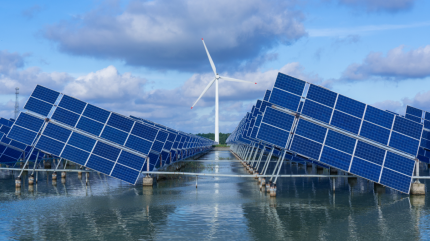
The International Renewable Energy Agency (IRENA) has confirmed that renewable power generation costs have continued to outcompete fossil fuel alternatives in 2024.
The agency’s latest ‘Renewable Power Generation Costs in 2024’ report highlights that 91% of new renewable projects were more cost-effective than new fossil fuel alternatives last year, with onshore wind and solar photovoltaics (PV) leading the charge.

Discover B2B Marketing That Performs
Combine business intelligence and editorial excellence to reach engaged professionals across 36 leading media platforms.
The report details that solar PV costs were on average 41% lower than the least expensive fossil fuel options while onshore wind projects were 53% cheaper.
Onshore wind remained the most affordable source of new renewable electricity at $0.034/kWh, followed closely by solar PV at $0.043/kWh.
This cost leadership has been driven by factors such as technological innovation, competitive supply chains, and economies of scale.
Adding 582 gigawatts (GW) of renewable capacity in 2024, these energy sources have led to substantial cost savings by avoiding fossil fuel consumption valued at approximately $57bn.

US Tariffs are shifting - will you react or anticipate?
Don’t let policy changes catch you off guard. Stay proactive with real-time data and expert analysis.
By GlobalDataRenewables have proven not only to be cost-competitive but also beneficial in reducing dependence on international fuel markets and enhancing energy security, thus strengthening the business case for their adoption.
Despite the optimism, the report acknowledges short-term challenges that could potentially increase costs. Geopolitical shifts, including trade tariffs, raw material bottlenecks, and evolving manufacturing dynamics, especially in China, are among the risks identified.
Higher costs are anticipated to persist in Europe and North America due to structural challenges such as permitting delays and limited grid capacity.
The report also underscores the importance of stable and predictable revenue frameworks to reduce investment risk and attract capital.
It notes that financing risk mitigation is crucial for scaling up renewables, with instruments such as power purchase agreements (PPAs) being instrumental in accessing affordable finance.
Conversely, inconsistent policy environments and opaque procurement processes can undermine investor confidence.
Integration costs are highlighted as a new barrier to renewable deployment, with grid connection bottlenecks and slow permitting processes causing delays in wind and solar projects.
This issue is particularly acute in G20 and emerging markets, where grid investment must align with the growing electricity demand and renewable expansion.
Financing costs remain a decisive factor in renewable project viability, with high capital costs in developing countries inflating the levelised cost of electricity (LCOE) due to macroeconomic conditions and perceived investment risks.
For instance, IRENA found that in 2024, onshore wind generation costs were similar in Europe and Africa at around $0.052/kWh, but the cost structures varied significantly due to differing capital expenditure and financing costs.
Technological advances beyond generation are also enhancing the economics of renewables. The cost of battery energy storage systems (BESS) has plummeted by 93% since 2010, reaching $192/kWh for utility-scale systems in 2024.
These reductions are attributed to manufacturing scale-up, improved materials, and optimised production techniques.
Battery storage and hybrid systems, along with AI-enabled digital tools, are becoming increasingly important for integrating variable renewable energy.
However, challenges such as digital infrastructure, flexibility, and grid expansion and modernisation must be addressed, particularly in emerging markets, to fully realise the potential of renewable energy.
IRENA director general Francesco La Camera said: “New renewable power outcompetes fossil fuels on cost, offering a clear path to affordable, secure, and sustainable energy. This achievement is the result of years of innovation, policy direction, and growing markets.
“However, this progress is not guaranteed. Rising geopolitical tensions, trade tariffs, and material supply constraints threaten to slow the momentum and drive up costs. To safeguard the gains of the energy transition, we must reinforce international cooperation, secure open and resilient supply chains, and create stable policy and investment frameworks—especially in the Global South.
“The transition to renewables is irreversible, but its pace and fairness depend on the choices we make today.”



